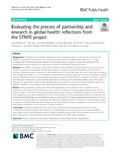| dc.contributor.author | Kalbarczyk, Anna | |
| dc.contributor.author | Rao, Aditi | |
| dc.contributor.author | Mahendradhata, Yodi | |
| dc.contributor.author | Majumdar, Piyusha | |
| dc.contributor.author | Decker, Ellie | |
| dc.contributor.author | Binte Anwar, Humayra | |
| dc.contributor.author | Akinyemi, Oluwaseun O. | |
| dc.contributor.author | Rahimi, Ahmad Omid | |
| dc.contributor.author | Kayembe, Patrick | |
| dc.contributor.author | Alonge, Olakunle O. | |
| dc.date.accessioned | 2022-05-16T04:47:21Z | |
| dc.date.available | 2022-05-16T04:47:21Z | |
| dc.date.copyright | 2020 | |
| dc.date.issued | 2020-08-12 | |
| dc.identifier.citation | Shahabuddin, A. S. M., Sharkey, A. B., Jackson, D., Rutter, P., Hasman, A., & Sarker, M. (2020). Carrying out embedded implementation research in humanitarian settings: A qualitative study in Cox’s bazar, Bangladesh. PLoS Medicine, 17(7) doi:10.1371/journal.pmed.1003148 | en_US |
| dc.identifier.uri | http://hdl.handle.net/10361/16604 | |
| dc.description | This article was published in BMC Public Health by BMC [© The Author(s). 2020 Open Access This article is licensed under a Creative Commons Attribution 4.0 International License] and the definite version is available at: https://doi.org/10.1186/s12889-020-08591-y The Journal's website is at: https://bmcpublichealth.biomedcentral.com/articles/10.1186/s12889-020-08591-y | en_US |
| dc.description.abstract | Background: Thoughtful and equitable engagement with international partners is key to successful research.
STRIPE, a consortium of 8 academic and research institutions across the globe whose objective is to map,
synthesize, and disseminate lessons learned from polio eradication, conducted a process evaluation of this
partnership during the project’s first year which focused on knowledge mapping activities.
Methods: The STRIPE consortium is led by Johns Hopkins University (JHU) in partnership with 6 universities and 1
research consultancy organization in polio free, at-risk, and endemic countries. In December 2018 JHU team
members submitted written reflections on their experiences (n = 9). We held calls with each consortium member to
solicit additional feedback (n = 7). To establish the partnership evaluation criteria we conducted preliminary analyses
based on Blackstock’s framework evaluating participatory research. In April 2019, an in-person consortium meeting
was held; one member from each institution was asked to join a process evaluation working group. This group
reviewed the preliminary criteria, adding, subtracting, and combining as needed; the final evaluation criteria were
applied to STRIPE’s research process and partnership and illustrative examples were provided.
Results: Twelve evaluation criteria were defined and applied by each member of the consortium to their
experience in the project. These included access to resources, expectation setting, organizational context, external
context, quality of information, relationship building, transparency, motivation, scheduling, adaptation, communication
and engagement, and capacity building. For each criteria members of the working group reflected on general and
context-specific challenges and potential strategies to overcome them. Teams suggested providing more time for
recruitment, training, reflection, pre-testing. and financing to alleviate resource constraints. Given the large scope of
the project, competing priorities, and shifting demands the working group also suggested a minimum of one fulltime project coordinator in each setting to manage resources.
Conclusion: Successful management of multi-country, multicentered implementation research requires
comprehensive communication tools (which to our knowledge do not exist yet or are not readily available),
expectation setting, and institutional support. Capacity building activities that address human resource needs for
both individuals and their institutions should be incorporated into early project planning. | en_US |
| dc.language.iso | en_US | en_US |
| dc.publisher | BMC | en_US |
| dc.relation.uri | https://bmcpublichealth.biomedcentral.com/articles/10.1186/s12889-020-08591-y | |
| dc.subject | Process evaluation | en_US |
| dc.subject | Partnership | en_US |
| dc.subject | Collaboration | en_US |
| dc.subject | Global health research | en_US |
| dc.subject | Expectations | en_US |
| dc.title | Evaluating the process of partnership and research in global health: Reflections from the STRIPE project | en_US |
| dc.type | Journal Article | en_US |
| dc.description.version | Published | |
| dc.contributor.department | Brac James P. Grant School of Public Health | |
| dc.identifier.doi | https://doi.org/10.1186/s12889-020-08591-y | |
| dc.relation.journal | BMC Public Health | |

